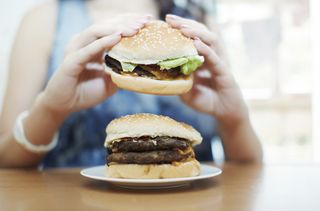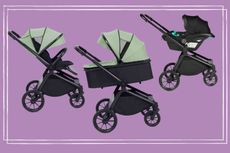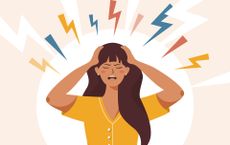How to stop comfort eating
It's time to take control and learn how to manage your emotional eating cravings.

Comfort or emotional eating is a complex issue and, can affect lots of people in very different ways.
Most of us have done things like ordering a pizza for dinner after a bad day at work. But for some, eating becomes a regular response to all sorts of emotions and can lead to bingeing, over-eating and obesity.
Do you think you might be an emotional eater? Is comfort eating something you recognise? Here, we help you to understand why you're doing it, and how you can stop.
Recognising your emotional eating triggers
Next time you find yourself over-eating or turning to unhealthy snacks, think back and figure out why you're doing it.
Are you experiencing an emotional hunger rather than a physical one?
How are you feeling at the moment? Are you lonely and need someone to talk to? Are you lacking body confidence? Do you hate your job and want to change career? Are you in an unhealthy relationship?
The chances are that you probably already know the reason you're turning to food, but maybe you haven't admitted it to yourself yet.
GoodtoKnow Newsletter
Parenting advice, hot topics, best buys and family finance tips delivered straight to your inbox.
It's unlikely there's going to be a quick fix for any of these problems, but getting to the root of the issue is key to overcoming emotional eating, so make a promise to yourself today to try and deal with the reasons behind your comfort eating. If you feel you need professional help, find the right person to talk to in our helplines round-up.
Create an anti-emotional eating meal planner
To stop eating when you're sad, angry, lonely or whatever your triggers are, you need to learn to take control.
Creating a healthy meal planner is a positive psychological step towards this. You're the one in charge of the food you eat, not the other way round.
Make sure you're getting the correct number of calories in your daily diet (2,000 for women and 2,500 for men) and also be sure to include some of your favourite treats in there. Lots of emotional eaters feel guilty after they've given in and had a binge, but by allowing yourself a small amount of something you love, you can begin to enjoy food again and look forward to meal and snack times.
Help create your meal planner with our 100s of healthy recipe ideas.
Balance your diet
By regulating your blood sugar levels you can help take the edge off your cravings.
Although comfort eating is emotionally triggered, you can lessen your cravings by making sure your blood sugar levels remain stable. This can be helped by avoiding high GI foods. Maintaining a low GI diet means you're eating foods which take longer to digest, helping you avoid the highs and lows of sugar rushes.
The Atkins Diet can help you control your blood sugar, as can Rosemary Conley's Low GI Diet.

Are you physically or emotionally hungry?
Lots of people who eat for emotional reasons have lost touch with what physical hunger feels like.
Following your meal and snack planner will help you understand when you're eating because you need to and when you're eating because you're using it as emotional support.
Next time you're about to eat something, stop and think about whether or not it's a physical need. Does your stomach feel empty? Remember, feeling full can can up to 20 minutes, so make sure you eat slowly to avoid over-eating.
Stress and emotional eating
Stress is one of the main reasons people comfort eat.
When things get too much it's tempting to look for something that will take our minds off the bad stuff that's going on. For lots of people, food offers this escape.
There are loads of different ways to deal with stress. You could try doing yoga, positive relaxation or perhaps you're simply not getting enough sleep.
Look through our stress guide to help you find out why you're feeling under pressure and what you can do about it. Tackling stress from a different angle will help you stop eating your way through tough times.
Exercise and emotional eating
You don't have to start running marathons or going to the gym every day, but upping your levels of activity could really help keep comfort eating at bay.
Emotional eating can be down to a lack of self-confidence. Gentle exercise (which can include walking, taking the stairs at work, getting off the bus one stop early) will create endorphins - chemicals that make you feel happy and therefore better about yourself.
If you're overweight exercise will also help you shed the pounds, look better and feel more positive about your life.
If you find exercising tough, try our 10 easy TV workouts - it's a totally accesible place to start, and you can do the moves whilst catching up on the soaps.
Find an emotional eating mantra
A mantra is a positive sentence you say to yourself which will help you stop giving in to the negative behaviour of comfort eating.
It needs to be personal to you, but here are some ideas to help you find yours:
*'I'll feel worse after I've eaten that and I don't deserve to feel bad about myself' *'I don't need to eat that because I'm strong, in control and I respect my body' *'I want to look great in my jeans more than I want that cake/biscuit/hunk of cheese'
Every time you feel yourself about to slip, repeat your mantra in your head, or out loud, and really think about what you're saying.

The 20 mins emotional eating rule
As an emergency measure, if a really strong craving catches you unawares, simply set your watch and wait 20 minutes.
Lots of people who comfort eat talk about feeling panicky as their cravings kick in. When the anxiety starts, tell yourself to wait 20 minutes. You don't need to tell yourself you won't have the food you're thinking about, just that you're waiting 20 minutes to make the final decision.
Hopefully, when your 20 minutes are up, the craving will have subsided and you will have regained the strength to stick to your mantra again.
Only eat in certain places
A big part to beating emotional eating is about breaking bad habits around food and setting new, healthy ones.
Set yourself eating areas like the dining room table, the canteen at work and the kitchen. Don't eat anywhere else, like at your desk or in front of the television.
This will help you associate food with eating because you're hungry, rather than mindless eating which is often what we do while we're stressed at our desks or feeling lonely watching the television.
Talk to someone about emotional eating
Sharing your food problems with someone close to you can be really helpful.
Not only are there obvious benefits in confiding in a friend, but you could also ask that friend to be your voice of reason when you're tempted to over-eat.
Explain your triggers and mantra to them and get them to talk sense into you when you're tempted.
More help
Call the Beat Eating Disorders helpline on 0845 634 1414 or visit b-eat.co.uk.
-
 What is a travel system? Baby gear experts explain how they work - and what’s included
What is a travel system? Baby gear experts explain how they work - and what’s includedExperts decode what is a travel system and offer tips on how to find the best one for you
By Charlotte Duck Published
-
 Magic Mixies Pixlings are a bestseller - but are they worth the money? We put this toy through its paces to find out
Magic Mixies Pixlings are a bestseller - but are they worth the money? We put this toy through its paces to find outMagic by name and magic by nature? We review Magic Mixies Pixlings to see if it lives up to the hype
By Sarah Handley Published
-
 Half of Gen Z say their parents 'don't take my mental health concerns seriously', research shows - here are 3 ways to help support older children
Half of Gen Z say their parents 'don't take my mental health concerns seriously', research shows - here are 3 ways to help support older childrenWith research showing that half of teens and young adults feel their parents don't take their mental health concerns seriously, we share how you can show your support.
By Ellie Hutchings Published
-
 12 signs of depression in children and what to do if you're worried, explained by experts
12 signs of depression in children and what to do if you're worried, explained by expertsKnowing the signs of depression in children is an important step towards being able to get professional help early, to avoid it having a long-term impact on a child's life.
By Ellie Hutchings Published
-
 How to manage stress: 12 tips from experts
How to manage stress: 12 tips from expertsIf you want to know how to manage stress, rest assured there are some simple and effective ways
By Debra Waters Last updated
-
 Panic attack symptoms, triggers and how to calm down
Panic attack symptoms, triggers and how to calm downPanic attack symptoms can affect us physically, mentally and emotionally - here's how to ease them, according to medical experts and therapists
By Debra Waters Published
-
 11 signs of stress - and expert tips on how to deal with them
11 signs of stress - and expert tips on how to deal with themWhat stress is, how to cope with the symptoms, and where to turn for help.
By Debra Waters Published
-
 Signs of depression – 11 symptoms to look out for
Signs of depression – 11 symptoms to look out forDepression affects nearly one in five adults in the UK, but when do feelings of sadness become a mental health issue?
By Debra Waters Published
-
 Breathing exercises for anxiety for adults and kids to try at home
Breathing exercises for anxiety for adults and kids to try at homeBy Rose Goodman Published
-
 How to practice 'gratitude meditation' - and four other tips to combat stress and burnout
How to practice 'gratitude meditation' - and four other tips to combat stress and burnoutStress is a modern epidemic – 40 per cent of us Brits experience stress and burn-out EVERY day. Could gratitude meditaion help? We explain how, along with other tips for combatting burnout.
By Sharon Sweeney Published